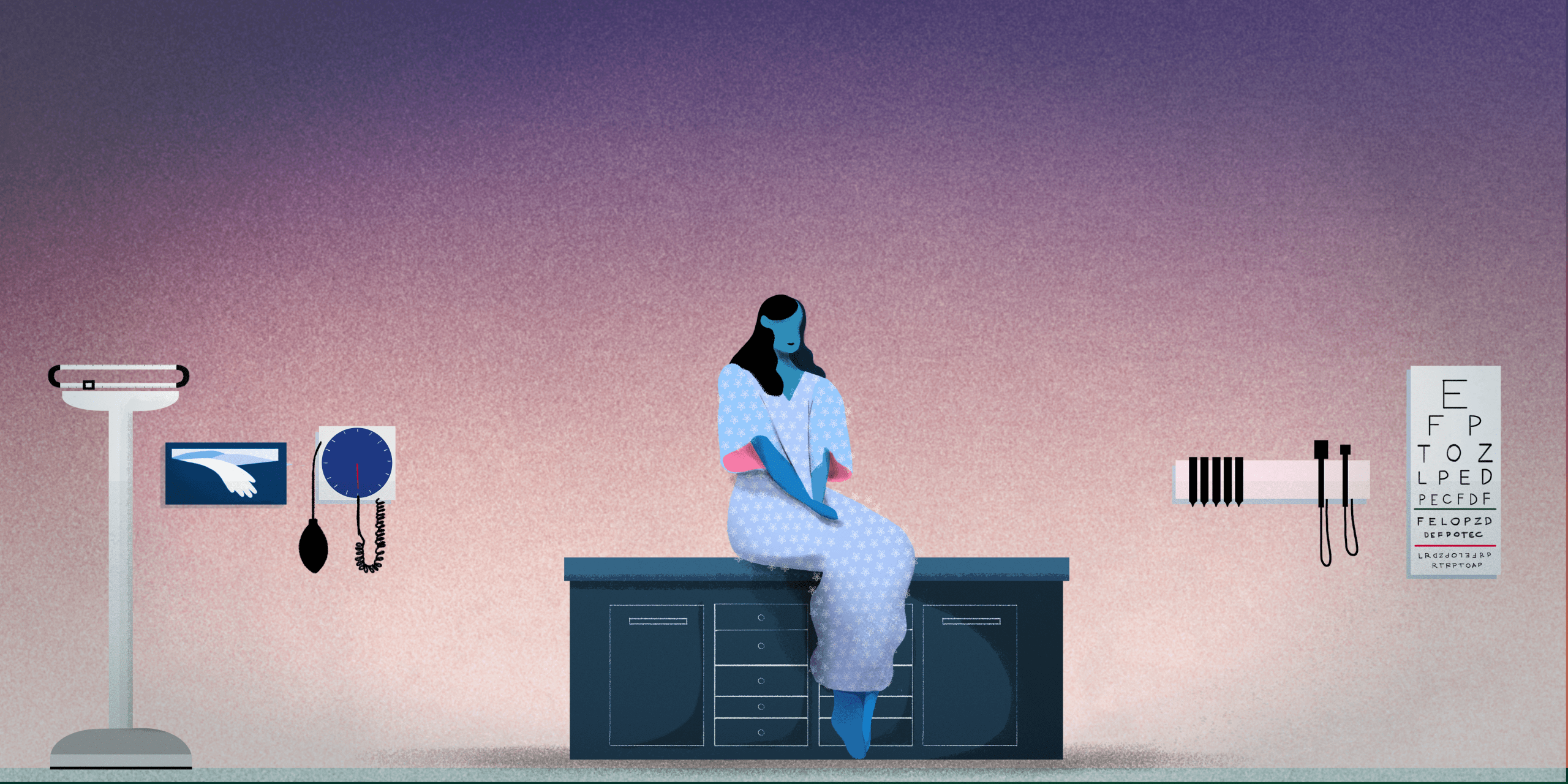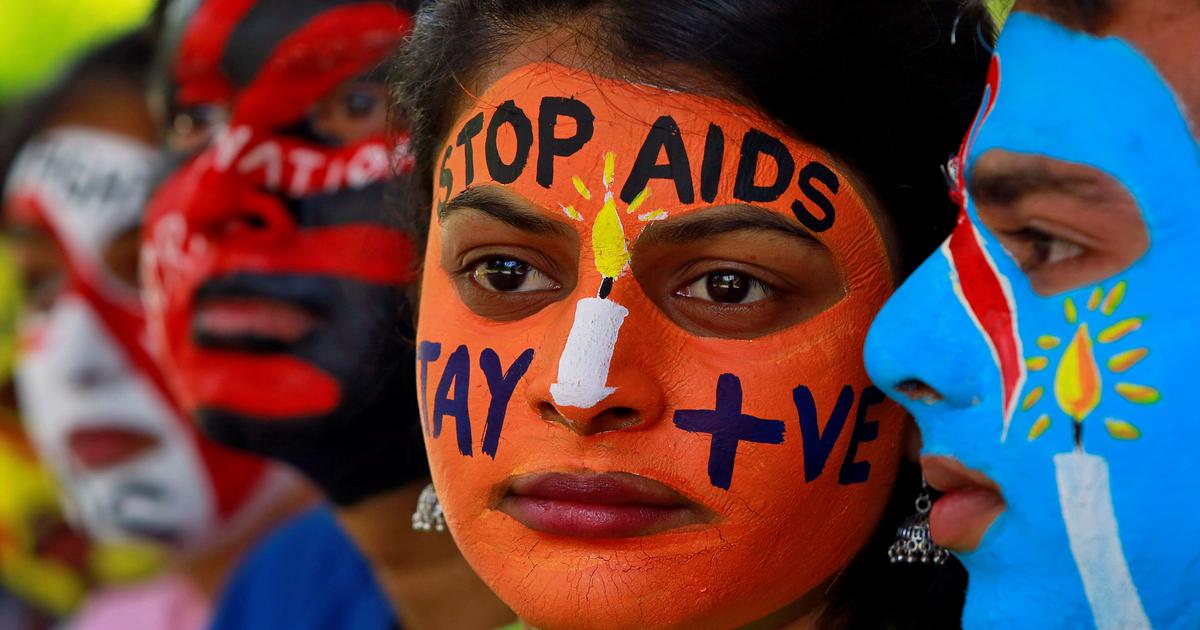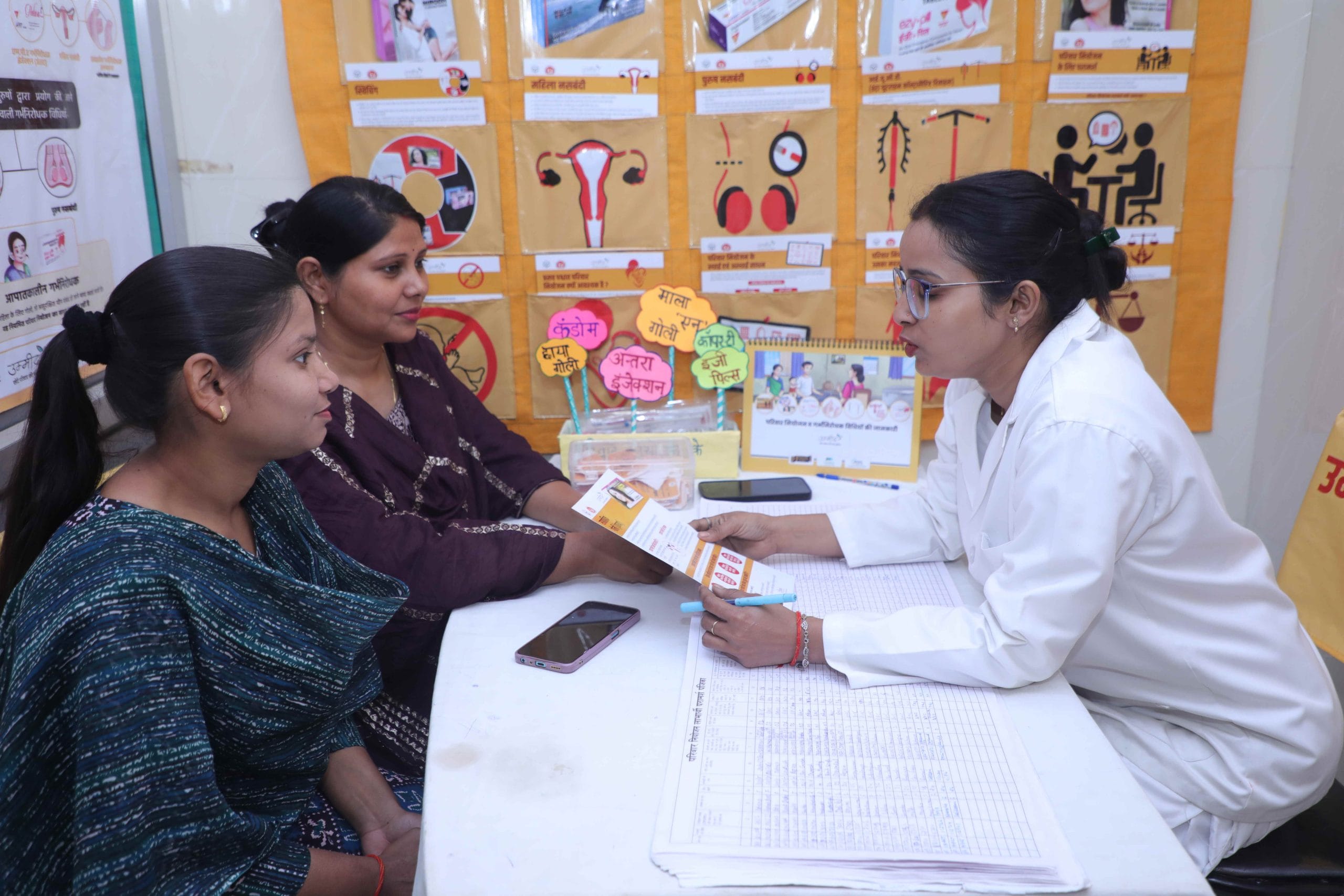Editor’s Note: This piece has been published as a part of the Health Over Stigma campaign, which is aimed at dismantling the stigma surrounding sexual health of unmarried women, and demanding accountability from medical service providers for stigma-free, non-judgemental sexual and reproductive healthcare services. Join the #MyGynaecStory wave by sharing your own story as an unmarried woman accessing sexual and reproductive healthcare by posting it on your social media or emailing us.
Posted by M. Chandra
Trigger Warning: Descriptions of debilitating pain
It started when I was fourteen. Dull, solid pain as violent as a rusty blade set into my stomach and expanding, everyday. For twenty minutes, I could hardly move or breathe or think, if was unsettling, consuming but not yet frightening. I wrote it off as an one off occurrence.
But it happened again. Multiple times a day, six-seven days a month before my menstrual periods (a fact that I noted only after several months had passed). The other twenty odd days weren’t pain free. I was still reduced to a mumbling mess if I was aroused or stimulated, but at least it wasn’t a perennial concern. At that age, I was still religious and wondered if pain upon sexual release meant I was being punished for my sins. But why did it hurt during other times? A thought that was quickly quelled by guilt and fear, and I tried my best to hide these episodes of pain. Multiple twenty minute intervals several times a day is not easy to hide, but I managed to handle any questions or observations.
After almost a year of this, when it was becoming clear that this wasn’t a problem that was going away on its own, and with the beginnings of fear and worry, I went to a gynaecologist. I had full faith in the healthcare system at that point and had no idea that this doctor visit was going to be different from any other doctor visit. I described that clutching my insides doubled over in pain, and she idly nodded, stated periods are hard (No shit, I have been menstruating since eleven and this had nothing to do with that) and told me to drink more water.
Oh! to mention at this juncture, that the first question every gynecologist asked me was Whether I was married. I had realised it was a substitute for the question whether I was sexually active…
I mentioned my unwavering faith in doctors. I believed her, felt ashamed that I had been such a baby over an obviously trivial issue and steadfastly ignored the pain for two more years. By now it lasted 12-14 days a month, exactly double the time it used to be and I was in my first year of college. The frequency of episodes and their intensity had increased too. Friends had noticed and urged me to try seeing a doctor again. I still had no idea how to advocate for myself or believe what my own body is feeling.
But I saw four more doctors in quick succession. When I received similar dismissive responses, I let it go. But something bothered me. They hadn’t even given me a physical exam. They hadn’t noted down my symptoms or asked a single question about them. Actually, they did ask whether I was a Hosteller and assumed lack of nutrition could be the reason despite me making it clear that the problem started two years before that. They put it down to normal period pain despite me repeating that it didn’t happen during my periods and was in fact two weeks before it. I still trusted them, but my shame was also mingled with doubt for the first time- not in myself, but in the standard of care I was receiving.
Another two years passed. I was eighteen, a legal adult, capable of making my own medical decisions. By now the pain was present every single day and almost every single minute. I was in constant, waking agony. I learnt to hide it from visibly showing on my face because I felt guilty about what might be a normal thing. I would excuse myself from classes when particularly difficult waves of pain hit (which was once every hour or two) and curl up in fetal position on the bathroom floor.
I tried every method to distract myself, but there isn’t much you can do when you cannot move or talk, and your eyes can’t focus. So I focused on not being loud, not crying or shouting, and dug my fingernails as deep into my skin as it would go. I was constantly nauseous. I was waking up thrice or more a night from the pain and ignored medical information that said nausea and waking up from sleep indicates pain higher than an eight on the pain scale and means that is very severe pain.
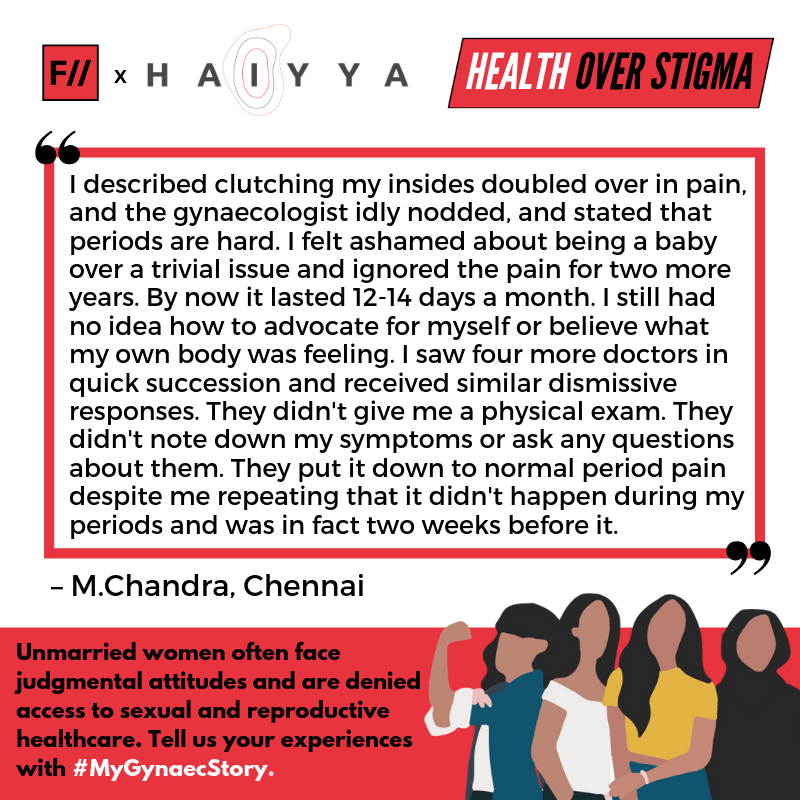
I saved up money, decided to see a doctor again, but this time mentioned one more symptom that I was leaving out before. I told the doctor that the pain intensified during arousal and reached levels high enough to make me vomit and lose control of other bodily functions if I orgasmed. I decided also, to demand a physical exam- both an external examination of my vulva and pelvis, and an internal examination of my vagina. I had read this was the standard procedure for a gynecologist everywhere else in the world, and figured that I was an adult consenting to a routine medical procedure, what could go wrong?
Oh boy.
The doctor straight up refused. She agreed to feel my lower abdomen with hand, but refused to do anything else. When prodded, she mumbled that she was uncomfortable that I was unmarried and didn’t want to damage my hymen. Oh, to mention at this juncture, the first question every gynecologist asked me was whether I was married. I had realised that it was a substitute for the question whether I was sexually active, but this was the first time I experienced that even blatantly stating I am sexually active (and clean from STIs, and always used protection) doesn’t erase the concerns about my hymen.
whether the woman is 18 or 30 – as an unmarried woman, her bodily autonomy or medico legal rights will not be recognised.
She finished her brief, cursory and chaste exam and told me she felt possible adhesion. She asked me to elaborate on my symptoms and suggested it could be a condition called endometriosis- and told me we could take an ultrasound. She said she could give very mild painkillers (medication that I had already tried before to no effect- they do not even make a dent), and also prescribed birth control pills to prevent ovulation but I didn’t know they were birth control pills until I looked them up. She refused to describe them as anything more than hormonal pills and when pressed further, said that it’s something married women take.
This was obviously far from a perfect visit and horrifies me looking back at it today, but it was miles better than any of my previous experiences with the doctor. I took the abdominal ultrasound as prescribed but it showed no abnormalities. The doctor told me there will no further reason for medication apart from taking medicines like paracetamol. I suggested a trans-vaginal ultrasound as they have better results but again, what about my precious hymen? My request was dismissed and I was shooed out of the office.

Less than a month later, it was end-semester time. I was in my fifth semester and was spending more time curled up on the bathroom floor than in my room. My roommate had grown used to hearing me cry or scream in the nights. I started vomiting food and water from the increasing nausea and hadn’t retained a meal in days. I had barely enough energy to crawl on all fours to the bathroom when no one was there in the corridor. If people were there, I leaned on my friends to go.
The morning of my third end-semester examination, I could not get up from the bed. I was debilitated. I was rushed to a hospital in an ambulance. Yet another doctor who ignored all my history and told me it was probably indigestion from mess food. NIT? Hosteller? Should have lied. I went back home, saw another doctor in a multi-specialty hospital. No exams. No trans-vaginal ultrasound. But some non invasive tests were ordered, and birth control pills prescribed again to stop ovulation.
For the first time in four years, something worked. I still had episodes, but they were fewer, farther along and reduced in their intensity. (I was on strong painkillers for a spinal condition so maybe that helped too). I continued to take this miraculous medication for an entire year and hoped my mom wouldn’t look up what the medicines her daughter was taking were actually called.
They finally consented but in the waiting room, called out my name with the suffix ‘Mrs.’ instead of ‘Ms.’ because they didn’t want the other patients to know such an outrageous thing was happening.
The inevitable happened though- she found out, and wanted me to stop taking them fearing I might have sex and I had two choices. Either go back to constant agony or face the consequence of telling my mother that I had made her fears come true a long ago and there was nothing the medicine would make me want to do that I wasn’t already doing. I chose the latter, and I am thankful every day for it.
Around this same time, I was doing a study on the LGBTQ inclusivity of the healthcare system for my internship and one component of the study was interviewing multiple healthcare providers in depth. In the course of those interviews, apart from learning how despicably queer people are treated by the healthcare system, (which deserves several articles of its own) one common thing that doctors said was they would never give unmarried women a vaginal exam. (They mostly had no concept that women could have same sex relationships too, so to them a woman having sex was equivalent to sexual intercourse between a penis and a vagina and this destroys the hymen and should happen only after marriage.)
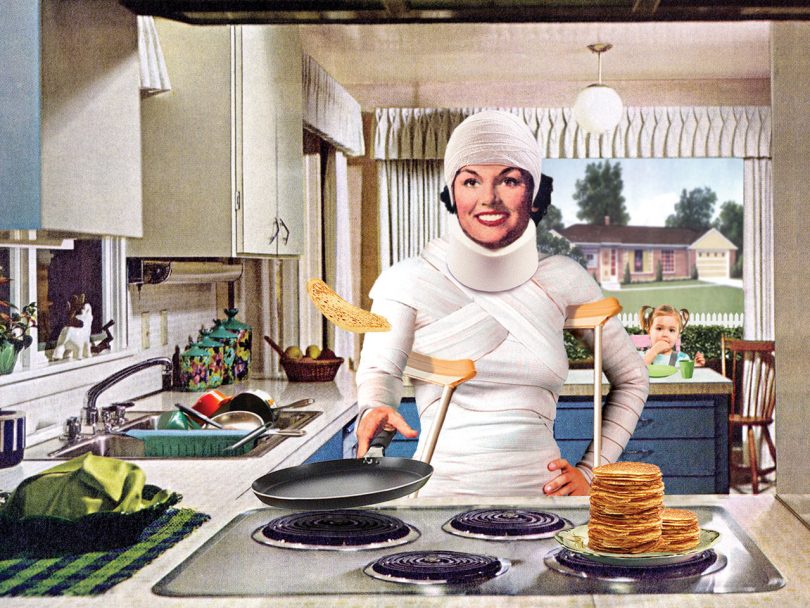
They gave a list of reasons – but the most common were concerns about the hymen, it made no difference that the women was an adult who had consented to the exam and even if she is sexually active and does not possess or care about a hymen. They said it would destroy her marriageability and unless her parents agree to the exam and give a written letter as well sign a waiver of responsibility they would not perform that fundamental procedure of gynecology.
Some doctors were afraid that the parents, finding that their daughter had no hymen and would not get married, would sue the doctor who performed the examination. They also said they would not perform procedures like trans-vaginal ultrasounds or scans even though it could show things an abdominal ultrasound cannot. I asked them what about life threatening situations and they stated incredulously, “Wouldn’t parents be involved anyway then? We can ask them.” And yes, this is true whether the woman is 18 or 30 – as an unmarried woman, her bodily autonomy or medico legal rights will not be recognised.
One doctor (who had 24 years of experience as a practicing physician) took it even further. She categorically stated that she would refuse to examine any unmarried woman for any reason at all unless her parents accompanied her. “An unmarried girl coming alone to the doctor without her mother is probably pregnant and wants an abortion. I will never perform abortions. Such things are illegal and immoral.” (For the record, abortions are perfectly legal in India upto 20 weeks of pregnancy).
Pain alone is still not an issue that is important enough to worry about in a woman, the severity is irrelevant.
I got my parents’ consent and went to get a vaginal exam and ultrasound. The reciptionist refused to give me an appointment and tried to talk me out of it. Two doctors tried to tell me to wait until I was married. I remained insistent. They finally consented but in the waiting room, called out my name with the suffix ‘Mrs.’ instead of ‘Ms.’ because they didn’t want the other patients to know such an outrageous thing was happening.
In the ultrasound room, stripped at the bottom, and lying down, I was asked once again if I would like to wait till I was married. I said no. Then I was asked to prepare for the pain and she inserted the probe, all the while telling me how unnecessary the procedure was. Then she abruptly stopped. There were shadows in the film. Masses. There was a physical manifestation of my pain (nothing close to a complete answer as I would come to know, but the first physical “proof” nonetheless that this was not all in my head). The test reports that day should have made me sad but I cried with relief. Finally, finally I wasn’t being dismissed and I wasn’t a crazy bitch making a mountain out of a molehill. I shed enough shame and guilt to clothe a village that day.
Today, I am twenty-one. That’s six years since the ordeal started. Ten doctors later, I had a decent gynecologist at last. She doesn’t judge me being unmarried, it’s a detail that doesn’t play a role in the medical care I receive, so she doesn’t pay any attention to it. We are exploring the reasons for my condition but aren’t close to an answer yet. Pain alone is still not an issue that is important enough to worry about in a woman, the severity is irrelevant.

With every passing year, the possibility that this is a permanent condition cannot be ignored. That I will never find a solution for this pain is possibly the truth. I have come to accept it. I may never have long term relationships when one can never count on sex being a painless experience with me. I might be infertile. I might find it difficult when I start working- I can’t take leave every time I experience a pain flare up, it probably isn’t even covered by sick leave. The hoops I jump through to get attendance condonation in college won’t work there.
But if there’s one thing that’s come out of all of this is that I have learnt to trust what my body says. Its sensations and illnesses are valid and legitimate. I have educated myself of my medical and legal rights and understood the necessity of insisting and demanding them. I have to speak for myself and I will. But should every woman spend half a decade learning the lesson? The path others face may be far difficult still. Millions, this moment are clutching their bodies in pain, trying futilely to avoid and hide it, and driving themselves insane with self doubt , mortification and self disgust. Such a basic right. And all in the name of a single piece of muscle that represents virginity. That’s all in my body anyone will ever care about, but it’s important that I continue to care for myself.
M.Chandra is just an opinionated woman treading cautiously in this world. You can follow her on Instragram.
Featured Image Source: Today
About the author(s)
Guest Writers are writers who occasionally write on FII.
